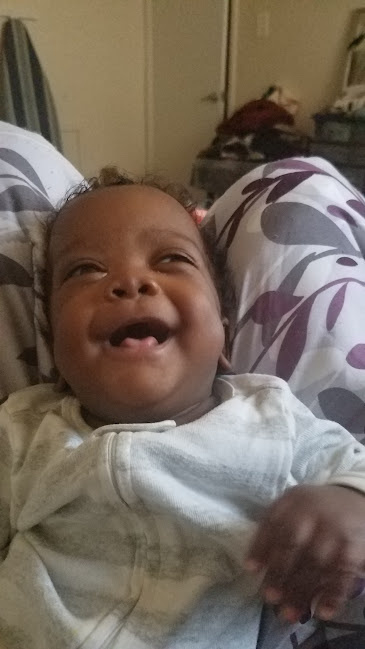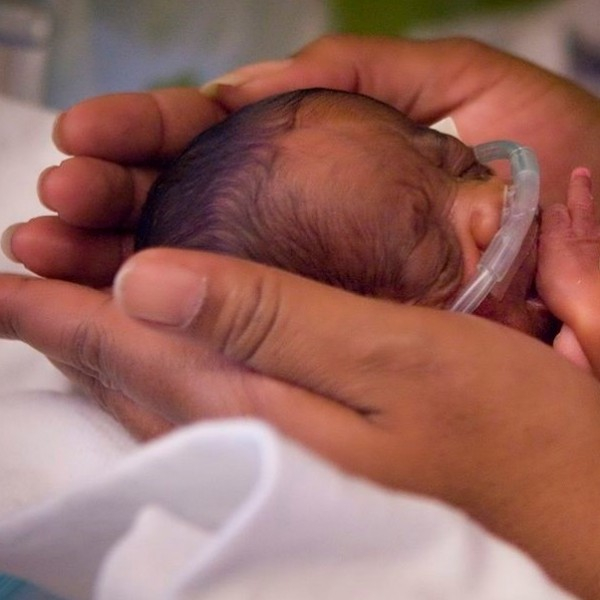
For the briefest of moments, K’La felt calm. The baby, Kweli, had been born prematurely at just 26 weeks gestation. He endured a two-month-long hospital stay in the NICU before he was finally released and sent home, and she had witnessed many close calls and heart-dropping moments throughout those first tenuous weeks.
Generally, babies who are born at less than 35 weeks gestation can have periods when they stop breathing or their heart rates drop. (The medical name for a slowed heart rate is bradycardia or “brady.”) K’La had seen Kweli brady many times, watching as the nurses placed their hands on his small torso and gently stimulate him, encouraging him to breathe again.

It could be incredibly anxiety-inducing, but it wasn’t altogether uncommon. She knew what to do if and when it happened. She knew to stay calm.
On this day, K’La had decided to take a nice long shower before Kweli’s first postnatal appointment with the pediatrician. It had been a rough few months – first finding out she was pregnant at 20 weeks, then unexpectedly delivering the baby at 26 weeks, and then enduring an extended NICU stay.

She wanted to just take her time and relax a bit, and since Kweli was sound asleep in the living room with her partner, she took advantage of the opportunity for some alone time.
She didn’t know it would be the final moments before everything came crashing down around her.
“My partner brought Kweli into the bathroom, and he held him out to me and said, ‘He’s not breathing,’” K’La told us. “Honestly, my first thought was, ‘Oh, it’s just a brady episode,’ but I could tell he needed infant CPR, which I began to give him.”
She then called 9-1-1 and rushed Kweli to the closest emergency room. It all happened so fast that the shower was still dripping, and wet footprints trailed across the tile. How could this have happened?
K’La and her partner were sitting in the hospital waiting room when she first began to wonder why no one was communicating with them or providing updates on Kweli’s condition. She kept watching the door, trying to make eye contact with the medical team but to no avail.
When they finally returned to the room, all they said was that they were flying the baby to the children’s hospital. “It was confusing because the hospital was really close by - maybe only a 15-minute drive away,” K’La recalled. “I just remember thinking, ‘Why are they flying him?’ And when I asked if I could go with him, they told me no.”

As the day unfolded, so did more of the story.
K’La and her partner were questioned about what happened before Kweli stopped breathing. Their stories were consistent: K’La was in the shower, and Kweli was with his dad. That one seemingly insignificant detail would change her life forever.
The two of them were at home when the police came. They burst through the front door, yelling out her partner’s name and immediately handcuffing him. K’La was in shock, unable to believe her eyes and trying to grasp what was happening…and why.
It was then that she learned the full extent of Kweli’s condition.
She learned that her son’s medical crisis didn’t stem from his prematurity or a bradycardia episode but from Shaken Baby Syndrome, a preventable, severe form of physical child abuse resulting from violently shaking an infant by the shoulders, arms, or legs. Kweli had broken and fractured bones and had sustained irreparable damage to his brain. He would never regain consciousness or responsiveness.
“The next time I saw my son,” K’La said, “He was unrecognizable. He was just so swollen.”

It was all so hard to understand, so hard to fathom. The before was so clear in her mind. Her partner, her 1-year-old daughter Zuri, her newborn son.
The after was a puzzle with pieces that weren’t meant to be snapped together. Her partner was gone, her kids without their father, and K’La left alone to untangle it all and come to terms with what had been done.
And that’s what she’s spent the last six years doing.

Immediately after Kweli’s injury, K’La packed up her home and moved her children to Louisana. She couldn’t stand to be in her house anymore - the trauma was too fresh, too tangible. She had to learn how to care for Kweli and his new needs, spending time learning from the nursing staff at a children’s step-down unit for kids with special needs.
And while Kweli’s condition hasn’t improved, he’s consistently well despite the hurdles he faces. He hasn’t had an emergency room visit in nearly three years, a remarkable feat for a child with a trach and complex medical needs. He’s so well cared for and loved, and it shows.
Big sis Zuri is a huge part of that, and she’s helpful in all the ways a 7-year-old can be. She empties the water cup in his ventilator, helps give him his medication, and even pushes him in the wheelchair. She also brings a lot of light and joy to her mom’s life, often singing and dancing in the living room and sparkling with a personality beyond her years. It helps, all of it helps.

Which leads us to you.
K’La learned long ago that advocating for herself and her family was the only path forward. After the unexpected loss of her job, her van was then repossessed, and she had every excuse she needed to give up. But she didn’t.

She found a new job that allowed her to support her family and continue providing that excellent level of care for Kweli and Zuri. The transportation part was harder to fix.
For a while, they relied on medical transport, a service that will pick up medically-fragile individuals and drive them to critical care appointments or procedures. Unfortunately, the only thing reliable about medical transport is its unreliability.
When K’La heard about Chive Charities and what we do to support families like hers, she thought it was a longshot that they’d be selected for aid, but knew she had to try.

Their story is full of the before and after. Before she got pregnant, before the baby came early, before his injury. Then the after. After that day in the shower, after becoming a single parent, after losing her job and her car. There’s a lot of sadness in their story. But there’s beauty in the after, too.
It’s in Zuri’s personality. It’s in Kweli’s three years of being consistently well. It’s in K’La’s ability to do whatever she has to do to advocate for her family.
And now, you’re part of that beautiful after. With the support of your generous and selfless contributions, we purchased a 2019 Dodge Grand Caravan from our partners at AMS Vans for a total impact of $49,794.

It will, unequivocally, change their lives for the better. In fact, it already has.
For so many of the recipients we serve, their stories are woven between the before and after, just like K’La, Kweli and Zuri. There’s heartache, tragedy, hope, and inspiration all throughout, but the throughline is easy to spot. There’s the moment before they find Chive Charities, and there’s the moment after. You’ve made it possible for more than 565 of them to keep moving forward, knowing there’s a community of supporters behind them. Be part of the next beautiful after, and DONATE HERE.








































-3__small.jpg)












































































































__small.jpg)










__small.jpg)






















































































_with_flag,_jason__emily_rowley-4__small.jpg)

































































































































-2__small.jpg)



























































































































































